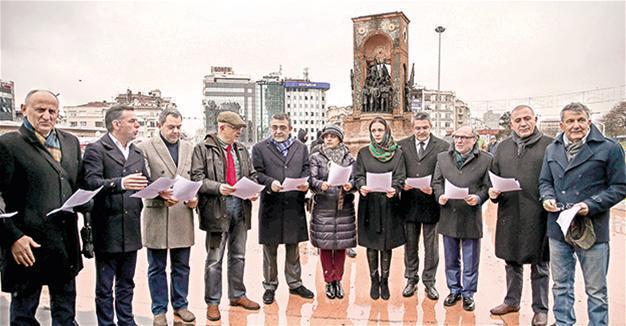Panel approves new charter with revisions, ready to submit to Turkish Parliament
ANKARA

AA photo
Turkey’s parliamentary constitutional committee approved a constitutional amendment package early on Dec. 30 after nine days of marathon talks, accompanied by tense sessions and a brawl between ruling and opposition lawmakers.The charter draft is expected to be submitted to the General Assembly in the second week of January at the latest.
Although the drafted package had been composed of 21 articles, it has been reduced to 18 with minor revisions on presidential duties and responsibilities.
The entire package grants broad executive power to the president by transferring all authorities of the prime ministry and the cabinet to the president while limiting parliament’s supervising and legislative authorities.
The proposal restricts the functions and powers of parliament, while the principle that stipulates the legislature’s duty to supervise the executive is removed from the constitution. Parliament will only have authority to acquire and monitor information through general discussions, parliamentary investigations, and written questions.
The article on the qualifications and impartiality of the president has also been amended. Accordingly, the president must have completed the age of 40, have completed higher education, and be qualified to be a deputy.
The president’s term of office will be five years, and one person can be elected as president no more than twice. The president’s membership will be removed once he/she is elected, but he/she will be able to preserve his/her ties with their political party, according to the amendment.
Presidential authorities expanded
The president will be the head of the state with the authority to issue laws and return laws to parliament for a revision. The cabinet, which has executive authority within the current constitution, will be annulled and all its authorities are transferred to the president.
The president will appoint and dismiss deputies and ministers, will send Turkey’s representatives to foreign governments and accept representatives of foreign states, will ratify and publish international treaties; will present laws on constitutional amendments to the public if deemed necessary, and will determine national security policies and necessary measures to be taken.
The president will also represent the commander in chief of the Turkish Armed Forces on behalf of parliament and will decide when to use the Turkish Armed Forces.
The president will have the right to file an annulation action to Constitutional Court about laws and parliament bylaws on the grounds that they violate the constitution.
The president will also have the right to issue regulations in order to ensure the enforcement of laws.
President’s decrees in state of emergency will have no restrictions
The president will also have the authority to issue presidential decrees on issues related to executive power. Basic rights and freedoms and political rights and freedoms will be excluded from the scope of the presidential decrees.
The president will not be able to issue decrees on issues that are clearly enacted by laws. If parliament issues the same law, the presidential decree will become null and void. However, the scope of the decrees will not be limited within state of emergency conditions.
The president will be able to declare a state of emergency for no longer than six months. Presidential decrees issued within state of emergency conditions will not be bound by the limitations of the ordinary term decrees. Within a state of emergency, the president may issue a presidential decree, irrespective of the fundamental rights, personal rights and duties, and political rights and duties imposed on matters which he or she requires.
Right to annul parliament
The president will have the right to decide to renew elections as well as parliament. Parliament can decide to annul itself with a three-thirds majority. If the president decides to renew an election, parliamentary elections and presidential elections will be held on the same day. If the president decides to renew elections, he/she will be able to run as a candidate one more time, irrespective of how many terms he/she may have served.
Structure of high judicial bodies changes
The structure of the Supreme Board of Judges and Prosecutors will also be amended. The term “supreme” will be extracted from the official name, making it simply become the Board of Judges and Prosecutors. Its 21 member configuration will be reduced to 13 members, four of whom will be attained by the president and seven of whom will be elected by the parliamentary majority. The justice minister will be the chair while the minister and its undersecretary will be permanent members.
The offer is expected to be submitted to the parliamentary debate in early January. The parliamentary process will be held in two stages. If the amendment gains more than 330 votes, a referendum will be held, and if the public approves the changes then the next election is expected to be held on Nov. 3, 2019.
















